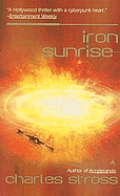
| Series: | Singularity Sky #2 |
| Publisher: | Ace |
| Copyright: | July 2004 |
| Printing: | July 2005 |
| ISBN: | 0-441-01296-5 |
| Format: | Mass market |
| Pages: | 433 |
Set in the same universe as Stross's novel-length debut, Singularity Sky, Iron Sunrise is a sequel of sorts, starring some of the same characters and referring to the events of the previous novel. That being said, it's quite readable independently and the sequel parts are some of the weaker parts of the book, so I wouldn't hesitate much to read it without having read the previous book.
Iron Sunrise opens with one of the most beautiful set pieces I've read, the destruction of an entire solar system by way of forced nova of its star. Stross excels at this sort of scene. He mixes hard science and beautiful description into an event that both blows the reader away with awe and shirks none of the emotional weight of its effects. The explosion isn't just pretty, it's significant. The survivors hurt. Destruction has consequences, political and emotional, and Stross doesn't let one forget the scale. The opening is again the strongest part of the book.
In mostly automated response to the destruction, the destroyed world of Moscow launches its deterrant fleet, a slower-than-light doomsday weapon, at it's most recent rival, a world of nearly a billion people who cannot all be evacuated in the four plus years it will take for the fleet to arrive. The fleet can only be recalled by convincing the remaining scattered officials of the Moscow government to send a secret recall code (and not send a secret forced go-ahead code), but some other group is murdering the remaining officials. This is when Rachel Monsour, UN arms control operative, gets involved.
Iron Sunrise focuses far more on Rachel than on Martin (who got much of the attention in the previous book). This is a definite improvement, since Martin not only continues to be a non-entity, he gets even worse. I'm not sure why Stross has so many problems making this one character interesting, since characterization even of supporting characters is otherwise a strength of this book and his writing in general, but Martin continues to be a person-shaped hole in the story. Thankfully, he is only a supporting character, so this is rarely a problem. For the next book in this universe, though, I hope Stross either overhauls him or writes him out completely.
The character who steals the show, though, is Wednesday, a rebellious, disaffected teenager with a serious black fetish and an attitude problem. She is among those evacuated from a deep space colony of Moscow as the system is destroyed. She is also an agent of the Eschaton, the trascended AI that is not a god in Stross's future universe but that does meddle in human affairs, suppressing in any way necessary any violations of causalty that could threaten its development. The way Stross handles Eschaton agents is one of the best parts of this future universe, and is handled even better here than in Singularity Sky. Wednesday's banter, cooperation, and debate with her "invisible friend" is the highlight of the book.
Stross has gotten better at endings. Singularity Sky sidetracked into mass confusion in which the characters didn't have much of a role. Iron Sunrise stays tightly plotted and keeps the characters active right up to the end. He is, however, still much better at openings than at endings. The beginning had me completely hooked, but the ending seemed like competent but not particularly exceptional science fiction thriller. I missed seeing more development of Wednesday as a character, and would have preferred that to a few of the chase scenes, battles, or confrontations. Stross seems just on the edge of writing a truly excellent novel, but still occasionally uses his characters as chess pieces.
Unfortunately, the other major flaw in this book are the villains, who are just a bit too evil and cliched to be believable. They're nowhere near as bad as, say, the villains from Weber's On Basilisk Station, but the totalitarian Nazi dominatrix attitude has been a bit overused and is a let-down compared to the strength of the rest of the book. It also may be pure coincidence, but I had a hard time shaking the feeling of similarity to one of the more frustrating Star Trek: The Next Generation episodes, particularly with the hook Stross leaves for a sequel. Maybe there are only so many ways to do this style of villain, and Stross certainly handles his villains more deftly, but the congruence was distracting.
Thankfully, Stross mostly focuses on the more interesting villains and throws in some nice complicating twists. None of the flaws hurt the book badly, and the exceptional beginning and strong characterization make it very much worth reading. Recommended. I'm looking forward to the sequel that feels like it should be coming, although I hope Stross works over the villains and takes them in a new direction.
Reviewed: 2005-10-20